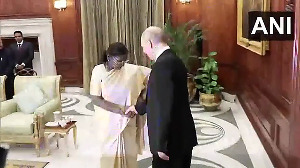 China on Tuesday said it had expressed concern to India through diplomatic channels over granting visa to Chinese dissident Dolkun Isa before it was revoked by New Delhi and hoped that the two sides would properly deal with the issue.
China on Tuesday said it had expressed concern to India through diplomatic channels over granting visa to Chinese dissident Dolkun Isa before it was revoked by New Delhi and hoped that the two sides would properly deal with the issue.
"We have noted relevant report. At first, we saw that India planned to issue visa to Dolkan, we expressed our concern to the Indian side immediately," Chinese Foreign Ministry spokesperson Hua Chunying told a media briefing.
"Dolkan is on the red notice of Interpol and we believe that it is the responsibility of all the countries to bring him to justice," she said.
"At the moment China and India are in very good communication and we hope the two countries will properly deal with the relevant issue," she said.
Later, officials said China has conveyed its concerns to India through diplomatic channels.
It is not a protest but China’s concerns have been conveyed to India, they said.
Isa, who heads the World Uyghur Congress, campaigns for the rights of Uyghur Muslims in Xinjiang province which is in turmoil for several years over protests against the settlements of Hans from different parts of the country.
Xinjiang, which has over 10 million Uyghur population of Turkik-origin, was on the boil for several years over Uyghur protests against the large-scale settlements of Hans from different part of the country.
China blames al Qaeda-backed East Turkistan Islamic Movement for the violence in Xinjiang and other parts of the country.
Chinese officials allege that Isa provided funding and training to ETIM militants to facilitate their terrorist activities.
Earlier, a Chinese state-run Think Tank said the cancellation of Isa’s visa by India will contribute to healthy development of relations between the two countries and it shows their common views in fighting terrorism and separatism.
“India has made a cogitative decision, and shows the common views of China and India in fighting terrorism and separatism, and the determination of further cooperation,” Fu Xiaoqiang, an expert on South Asian studies at the China Institutes of Contemporary International Relations, told the Global Times.
“It will contribute to the healthy development of relations between China and India,” Hu said.









